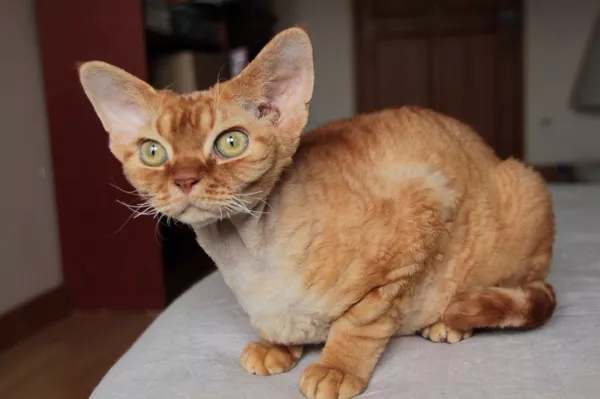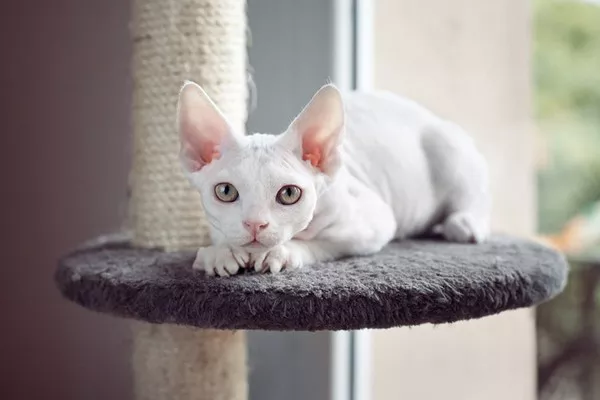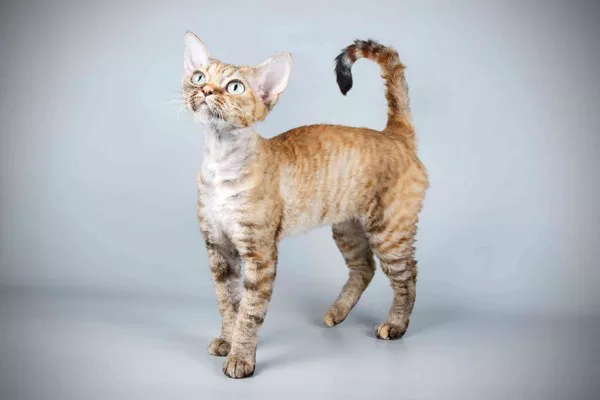Cats are beloved pets worldwide, but for those with allergies, owning a cat can be challenging. The Devon Rex, with its unique appearance and charming personality, is often considered a suitable option for allergy sufferers. This article explores whether the Devon Rex cat is truly hypoallergenic, delving into the science of allergies, the characteristics of the breed, and the experiences of cat owners.
Understanding Cat Allergies
To understand whether the Devon Rex is hypoallergenic, it’s important to first grasp the basics of cat allergies.
What Causes Cat Allergies?
Cat allergies are primarily caused by proteins found in a cat’s skin cells (dander), urine, and saliva. The most common allergenic protein is Fel d 1, produced by all cats to varying degrees. When cats groom themselves, this protein is spread onto their fur and skin, which then sheds into the environment.
Symptoms of Cat Allergies
Allergic reactions to cats can range from mild to severe and typically include:
Sneezing
Runny or stuffy nose
Itchy, watery eyes
Skin rashes or hives
Wheezing, coughing, or shortness of breath
For individuals with asthma, exposure to cat allergens can trigger or worsen symptoms.
How Are Cat Allergies Diagnosed?
Cat allergies are usually diagnosed through a combination of medical history, physical examination, and allergy tests such as skin prick tests or specific IgE blood tests. These tests help identify sensitivities to specific allergens, including cat dander.
The Devon Rex: A Unique Breed
The Devon Rex is a distinct and fascinating cat breed known for its curly coat, large ears, and playful demeanor.
Physical Characteristics
The Devon Rex stands out with its unique physical traits:
Curly Coat: The most distinctive feature is its soft, curly coat, which is less prone to shedding than that of many other cat breeds. The fur can range from almost bald to a dense, plush wave.
Large Ears: The breed has oversized ears that are set low on the head, giving it an elf-like appearance.
Slender Build: Devon Rex cats are small to medium in size, with a lean, muscular body and long legs.
Temperament and Behavior
Devon Rex cats are known for their friendly and outgoing personalities:
Affectionate: They are highly affectionate and enjoy being close to their owners, often following them around the house.
Playful: This breed retains a kitten-like playfulness throughout its life, making it a delightful companion.
Intelligent: Devon Rex cats are intelligent and can be trained to perform tricks or follow commands.
History of the Devon Rex
The Devon Rex breed originated in England in the 1960s. A stray cat with curly fur was discovered in Devon, and through selective breeding, the distinct characteristics of the Devon Rex were established. The breed gained recognition and popularity due to its unique appearance and engaging personality.
Are Devon Rex Cats Hypoallergenic?
The term “hypoallergenic” suggests that a particular breed of cat is less likely to cause allergic reactions. However, no cat breed is completely hypoallergenic. The question then becomes whether Devon Rex cats produce fewer allergens compared to other breeds.
Fur and Dander
The Devon Rex’s curly coat is often cited as a reason for its hypoallergenic reputation. Because the fur is less likely to shed, it may carry fewer allergens into the environment. However, this does not mean that Devon Rex cats do not produce allergens.
Production of Fel d 1
Studies have shown that the amount of Fel d 1 produced can vary widely between individual cats, regardless of breed. Some Devon Rex cats may produce lower levels of this allergen, but this is not guaranteed for every cat in the breed.
Owner Experiences
Many owners of Devon Rex cats report fewer allergy symptoms compared to other breeds. This anecdotal evidence suggests that some people with mild to moderate cat allergies might find living with a Devon Rex more tolerable. However, individual responses can vary widely.
See Also: When Will My Calico Cat Calm Down?
Managing Allergies with a Devon Rex
For allergy sufferers considering a Devon Rex, there are several strategies to manage and reduce allergic reactions.
Regular Grooming
Regular grooming can help reduce the amount of loose fur and dander. Brushing your Devon Rex and wiping it down with a damp cloth can minimize allergens on the coat.
Bathing
Occasional bathing may help reduce the allergen load on your cat’s fur. Use a cat-friendly shampoo and be mindful not to over-bathe, as it can dry out the skin.
Clean Environment
Maintaining a clean home is crucial in managing cat allergies:
Vacuum Regularly: Use a vacuum cleaner with a HEPA filter to capture dander and hair from carpets, furniture, and floors.
Air Purifiers: HEPA air purifiers can help remove airborne allergens from your home.
Wash Bedding: Wash your cat’s bedding and your own frequently to reduce allergen buildup.
Create Allergen-Free Zones
Designate certain areas of your home, such as bedrooms, as allergen-free zones. Keep the cat out of these areas to create a safe space for allergy sufferers.
Medication
Over-the-counter or prescription allergy medications, such as antihistamines and nasal corticosteroids, can help manage symptoms. Consult with an allergist for personalized advice and treatment options.
Scientific Studies and Findings
Several scientific studies have examined the hypoallergenic properties of various cat breeds, including the Devon Rex.
Study on Allergen Levels
A study published in the Journal of Allergy and Clinical Immunology found that individual cats, regardless of breed, produce varying amounts of Fel d 1. While some breeds like the Devon Rex may shed less, the overall allergen production is not significantly different across breeds.
Impact of Coat Type
Research indicates that cats with different coat types (e.g., curly vs. straight) do not necessarily produce different levels of allergens. However, coat type can affect how much allergen is spread into the environment, which may influence perceived hypoallergenic qualities.
Owner Reports and Anecdotal Evidence
Anecdotal reports from Devon Rex owners often suggest fewer allergic reactions. These experiences highlight the variability in individual responses and the potential for some allergy sufferers to coexist with this breed more comfortably.
Comparing the Devon Rex to Other Breeds
How does the Devon Rex compare to other breeds commonly considered hypoallergenic?
Sphynx
The Sphynx, known for its hairlessness, is another breed often recommended for allergy sufferers. While they do not shed fur, they still produce Fel d 1 and require regular bathing to remove oils and allergens from the skin.
Balinese
The Balinese, despite its long fur, is sometimes considered hypoallergenic due to lower levels of Fel d 1 production. This breed can be a good option for those with mild allergies.
Siberian
Siberian cats are believed to produce less Fel d 1 compared to other breeds. They have a thick coat, but many allergy sufferers report fewer symptoms with Siberians.
Choosing a Devon Rex: What to Consider
If you are considering a Devon Rex cat despite having allergies, there are several factors to keep in mind.
Spend Time with the Breed
Before bringing a Devon Rex home, spend time with the breed to see how your allergies react. Visit breeders, shelters, or friends who own Devon Rex cats to gauge your tolerance.
Breeder and Health Considerations
Choose a reputable breeder who prioritizes the health and temperament of their cats. Ensure the breeder provides proper health screenings and socialization for their kittens.
Lifestyle and Commitment
Devon Rex cats are social and active, requiring plenty of attention and interaction. Ensure your lifestyle can accommodate the needs of this playful and affectionate breed.
Conclusion
The Devon Rex cat, with its unique appearance and endearing personality, may be a more suitable option for some allergy sufferers. While no cat is truly hypoallergenic, the Devon Rex’s low-shedding coat and individual variability in allergen production can make it a better choice for those with mild to moderate allergies. Managing cat allergies involves a combination of regular grooming, maintaining a clean environment, and possibly using allergy medications. Ultimately, spending time with a Devon Rex before making a decision and consulting with an allergist can help determine if this delightful breed is the right fit for your home.
























